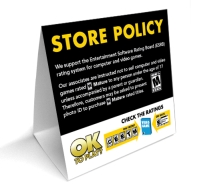7 Worst Retail Store Policies

Sometime when small business owners try to set forth store policy they often forget to make store policy buyer friendly. All of these policies were designed to save the company money, save guard the company property or protect it from litigation. They are very good at doing all these things but the very best job these policies do is to scare customers away and dry out customer traffic.
Final Sale—No returns no exchanges
The second a man looking for gift for a woman hears this policy he is out the door before the sales associate finishes the sentence. The only way anyone will buy from a store with this type of return policy is to make the price so low it’s a steal. Of course to make the price so low quality is often sacrificed. A final sale means, “I wouldn’t have that merchandise back in my store again.” A final sale means I’m looking for a quick sale not a lifelong customer.
Store Credit Only—What if she doesn’t like it? You can exchange it for anything in the store. What if she doesn’t want anything in this store? Anyone unsure about a purchase will never take a chance with a store that has this type of policy. Store credit means they took your money and they’re not about to give it back. If you can’t find anything you like, the store will keep your money, invest it, and get paid interest for however long it takes you to find something you want in their store. Very good for them not so good for the customer.
15% Re-Stocking Fee—A lot of electronic and computer stores have this policy. As soon as you walk out the door the 15% re-stocking fee applies, even if it takes you 2 minutes to walk back. The rational for this fee is that it cost them money to repackage, re-tag, and re-stock the item back on the shelf. Some jewelry stores have joined in and are now charging the 15% to returns that just walked out the door. On a $1500 purchase a customer can lose $225 on an item he held for two minutes if he changes his mind even if he never left the store. Talk about shopping around before making up your mind.
No Return Without a Receipt—The is no excuse at a time where every customer transaction is imputed into a computer, for a store to require a receipt for an exchange or a return. It’s Ok if you jut bought shampoo or a baseball at your local mall. But if you bought a major appliance, electronics, cell phones, jewelry, furniture, or any other substantial purchase the store should have the receipt in their system. Radio Shack asks for name, phone number, and zip code just to purchase batteries. A store that adopts this policy, it’s telling customers they will not be very friendly after the purchase.
Final Sale on Layaways—Customer use layaways as a convenient way to pay for something in installments. It is mostly used by customers who cannot or are reluctant to use credit or don’t have the full amount available at the moment. It sometimes takes months to pay for the item and sometimes by the time the item is paid up a customer may have a change of heart. Jewelry placed on layaway for a girlfriend’s birthday, may become unnecessary if we’re no longer dating that person. Even a store credit is better than getting stuck with an item I don’t want.
No Layaways—Some stores frown on layaways. It seems like a low class transaction to them. Store owners should love layaways. A layaway deposit is like an interest free loan from customers. You can use that money for whatever you want for as long as the layaway is being paid. Multiply that by all the stores a company may have and it turns into hundreds of thousands of dollars or even millions of dollars, (Walmart) in interest free money. Sure you could have sold the merchandise but if you take into account the inventory turnover, most times the item would have remained unsold in the case far longer than on layaways. Of course the most logical reason for offering layaways is to capture those customers who don’t have access to credit or don’t have the cash now, yet with layaway you can turn those customers into loyal paying clients.
No Merchandise Transfer---This sounds like it would save the company money on shipping and insurance but it also cuts down in the customer service effort dramatically. The store has the product, has a customer willing to buy the product but won’t sell it because the customer is not at the same location as the product. Instead of moving the product to where the customer is they try to move the customer to where the product happens to be. You can barely get a customer to come to the store, to ask him to go to another location to buy what they want is to disregard the customer’s needs.
At the heart of all these policy is the lack of thought for customer service. Some of these stores will continue to change Mangers or sales associates trying desperately to attract customers, when all they had to do to increase sales and make the store twice as profitable is to make their policies more buyer friendly.




